#postcolonialism
Text
DECOLONIAL ACTION READING
I recently compiled these to add to a comrade’s post about Land Back, but actually I think they deserve their own post as well.
Amílcar Cabral - Return To The Source
Frantz Fanon - The Wretched Of The Earth
Hô Chí Minh - archive via Marxists.org
Thomas King - The Inconvenient Indian
Abdullah Öcalan - Women’s Revolution & Democratic Confederalism
Edward Said - The Question Of Palestine
Thomas Sankara - archive via Marxists.org
Eve Tuck & K. Wayne Yang - Decolonization Is Not A Metaphor
Other key names in postcolonial theory and its practical application include:
Sara Ahmed
Homi K. Bhabha
Aimé Césaire
Albert Memmi
Jean-Paul Sartre
Léopold Séder Senghor
Gayatri Chakravorty Spivak
All of these will help you interpret and confront the realities of colonisation, and ideally help us understand and extend solidarity to comrades around the globe. Decolonise your mind, and don't stop there!
#land back#postcolonial#postcolonialism#postcolonial theory#decolonization#decolonize#decolonise#decolonisation#Edward Said#Tuck & Yang#Frantz Fanon#Amilcar Cabral#Free Ocalan#Sankara#Ho Chi Minh#Thomas Sankara#Abdullah Ocalan#original#Thomas King#Eve Tuck#K. Wayne Yang
2K notes
·
View notes
Text


Naipaul first visited India in the 1960s, a journey that "broke his life into two" — the same decade as when he extensively travelled the postcolonial ‘Third World’. This is articles from those years. A clinical and moving bunch on the impossibility of decolonisation and the long shadow of empires; on his encounter with India in a decade of famine, war, drought, and reform; a fragmented country "without even an idea of a graded but linked society"; on the teeming mass of former ‘colonials’ who can’t help but seek out a metropolitan life.
Loved this to bits.
#booklr#books#stuydblr#coffeeblr#study aesthetic#bookstagram#decolonization#v s naipaul#reading#postcolonialism#india#study space#coffee aesthetic#book quotes#book photography#studyspo#academia#historyblr#gradblr
467 notes
·
View notes
Text
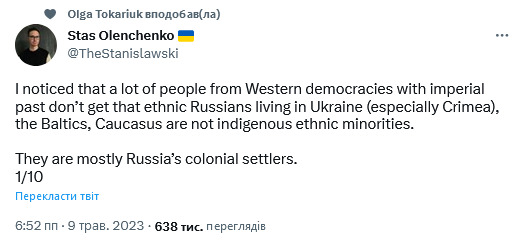







#ukraine#russia#war in ukraine#russian invasion in ukraine#imperialism#russian imperialism#postcolonialism#politics
594 notes
·
View notes
Text
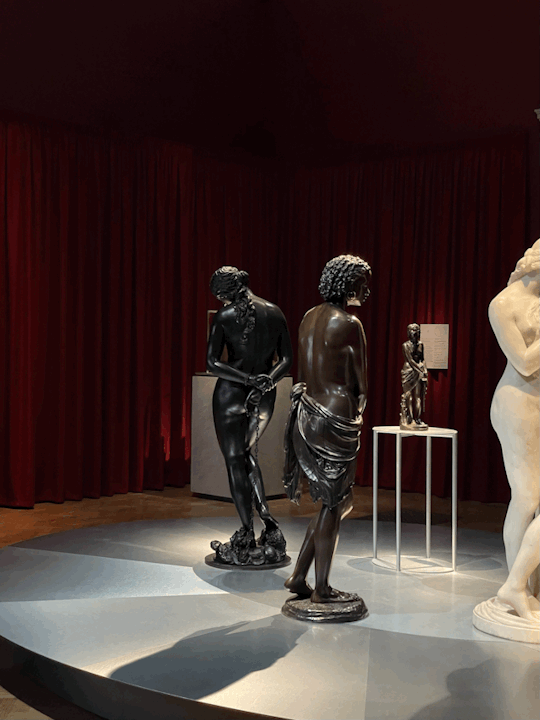

Statues and busts in the 'Entangled Pasts, 1768–now: Art, Colonialism and Change' exhibition at the Royal Academy of Arts
#studyblr#studygram#studyspo#bookblr#books#study#bookstagram#booklr#london#art#colonialism#postcolonialism#postcolonial theory#artwork#abolition#abolitionists#exhibition#gallery#royal academy of arts#royal academy
70 notes
·
View notes
Text
By: Jonathan Haidt
Published: Dec 22, 2023
[Note: this is post #1 of a pair of posts. The second post gives the text of chapter 3 of The Coddling of the American Mind.]
In the days after the October 7 Hamas attack on Israel, university campuses immediately distinguished themselves as places set apart from the rest of American society—zones where different moral rules applied. Even before Israel began its military response, the loudest voices on campus were not university leaders condemning the attacks and vowing solidarity with their Jewish and Israeli students. Instead, the world saw faculty members and student organizations celebrating the attacks.
Political commentator and Atlantic author David Frum summed up the moral uniqueness of the academy in this tweet, four days after the attack:
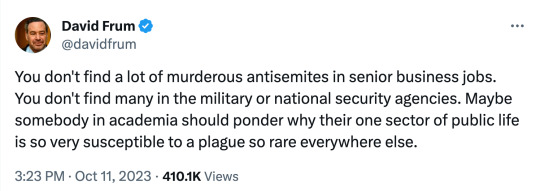
Since then, there have been hundreds of antisemitic incidents on campuses including vandalism of Jewish sites, physical intimidation, physical assault, and death threats against Jewish students, often from other students. The response from university administrators has often been slow, weak, or entirely absent.
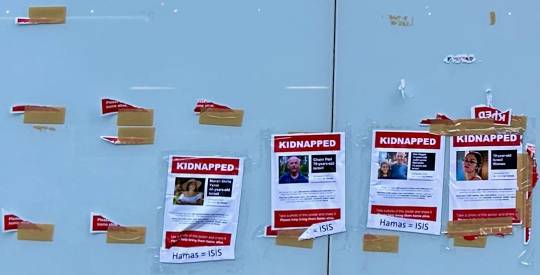
[ Image. The scene on the exterior wall of my office building at NYU on the morning of October 17, 2023. NYU students had posted fliers about Israelis kidnapped by Hamas. Other NYU students tore them down. Other NYU students posted more of them. ]
Why is the culture of elite higher education so fertile for antisemitism, and why are our defenses against it so weak? Don’t we have the world's most advanced academic concepts and bureaucratic innovations for identifying hatred of all kinds, even expressions of hatred so small, veiled, and unconscious that we call them “micro-aggressions” and “implicit biases”?
Yes, we do, but it turns out that they don’t apply when Jews are the targets,1 and this was the shocking hypocrisy on display in that Congressional hearing room on December 5. Congresswoman Elise Stefanik asked the President of the University of Pennsylvania “Does calling for the genocide of Jews violate Penn's rules or code of conduct, yes or no?” President Magill was unable to say yes. When the question was asked in various ways to all three presidents, none could say yes. All said variations of “it depends on the context.”
Now, as a social psychologist who studies moral judgment, I’m all for context. Technically, those presidents were correct that students chanting “from the river to the sea” may or may not be advocating killing all the Jews in Israel. Those chanting “globalize the intifada” may or may not be calling for terrorist attacks on Jewish sites around the world. And even if they were, such political speech is protected by the First Amendment unless the speech is made in a context that is likely to incite actual violence, constitutes a “true threat,” or rises to the level of discriminatory harassment. Those three presidents could have said that their universities are bastions of free speech where everyone lives and dies by the First Amendment.
In fact, they tried to say that, and this is why they were so widely pilloried for hypocrisy. Like most elite schools, Harvard, Penn, and MIT have spent the last ten years punishing professors for their research findings and disinviting speakers who questioned the value of DEI. (See The Canceling of the American Mind for dozens of other examples.) As has been widely reported, Harvard and Penn are the top two schools in America for creating terrible speech climates, according to the Foundation for Individual Rights and Expression.
What on earth happened to the academy? As Fareed Zakaria recently asked: How did America’s elite universities go from being “the kinds of assets the world looks at with admiration and envy” just eight years ago, to becoming objects of ridicule today? How did we bungle things so badly?
Greg Lukianoff and I wrote a book that tried to answer that question in 2018, as it was happening.
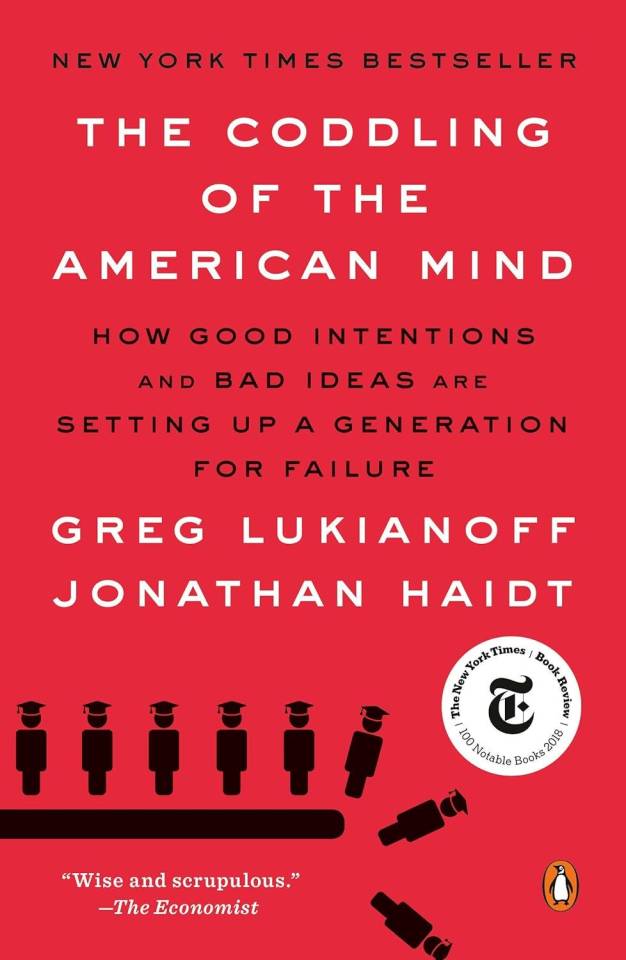
The Coddling of the American Mind tells the story of how American universities lost their collective minds, beginning around 2014 when student demands for protections from speech seemed to appear out of nowhere, including calls for trigger warnings, safe spaces, bias response teams, and mandatory trainings around language use. The students were supported by some faculty members and some administrators, and their combined force pressured many university leaders to accede to their demands even though, privately, many had misgivings.2
The new morality driving these reforms was antithetical to the traditional virtues of academic life: truthfulness, free inquiry, persuasion via reasoned argument, equal opportunity, judgment by merit, and the pursuit of excellence. A subset of students had learned this new morality in some of their courses, which trained them to view everyone as either an oppressor or a victim. Students were taught to use identity as the primary lens through which everything is to be understood, not just in their coursework but in their personal and political lives. When students are taught to use a single lens for everything, we noted, their education is harming them, rather than improving their ability to think critically.
This new morality, we argued, is what drove universities off a cliff. For a while, the descent was gradual, but at Halloween, 2015, in a courtyard at Yale, the free fall began. Students and administrators espousing the new morality demanded reforms at Yale and, over the next few months, at dozens of other schools. With a few exceptions, university leaders did not stand up to the new morality, critique its intellectual shortcomings, or say no to demands and ultimatums.
You can see the fall of higher ed in data from Gallup. The figure below shows that as recently as 2015, most Democrats and even most Republicans had high confidence in higher education as an institution. (Independents were evenly split). A mere eight years later, higher ed had alienated not just Republicans, but also independents. The trend for Democrats was down as well. The survey was fielded in June of 2023, well before the current mess.
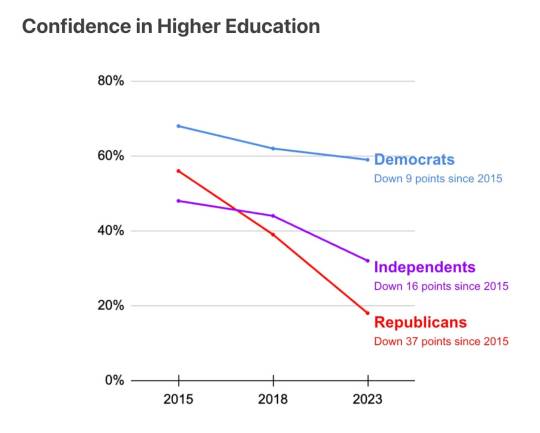
[ Figure 1. Percent of U.S. adults with "a great deal" or "quite a lot" of confidence in higher education. Source: Gallup (2023). ]
The good news is that the academy’s free fall is now over. American higher ed hit rock bottom on December 5, 2023 in that Congressional hearing room. Anyone who wants universities to bounce back and regain the trust of the American people must understand this new morality and ensure that it never holds sway on campus again.
The key chapter for understanding the new morality is chapter 3. I recently re-read that chapter and thought it would be of help to those who are struggling to comprehend the enormity of the culture change on so many campuses since 2015. Greg and I explained the transformation as the triumph of a cognitive distortion—binary thinking—such that students learn to slot everyone into one of two boxes: oppressor or victim.3 This mindset is the psychological basis of one of the three “Great Untruths” that we found flourishing on college campuses in the 2010s: Life is a battle between good people and evil people.4 We said that this was a terrible thing to teach students, and we explained why we expected that students who embraced this untruth would damage their mental health. (Subsequent research has confirmed this prediction.)
The central portion of the chapter describes two different kinds of identity politics, one of which is good because it actually achieves what it says it is trying to achieve, and because it brings both justice and, eventually, better relationships within the group. We called this “common humanity identity politics.” It’s what Martin Luther King, Jr., and Nelson Mandela did by humanizing their opponents and drawing larger circles that appealed to shared histories and identities. The other form we called “common enemy identity politics.” It teaches students to develop the oppressor/victim mindset and then change their societies by uniting disparate constituencies against a specific group of oppressors. This mindset spreads easily and rapidly because human minds evolved for tribalism. The mindset is hyper-activated on social media platforms that reward simple, moralistic, and sensational content with rapid sharing and high visibility.5 This mindset has long been evident in antisemitism emanating from the far right. In recent years it is increasingly driving antisemitism on the left, too.
Common enemy identity politics is arguably the worst way of thinking one could possibly teach to young people in a multi-ethnic democracy such as the United States. It is, of course, the ideological drive behind most genocides. On a more mundane level, it can in theory be used to create group cohesion on teams and in organizations, and yet the current academic version of it plunges organizations into eternal conflict and dysfunction. As long as this way of thinking is taught anywhere on campus, identity-based hatred will find fertile ground.
With permission from Penguin Press, Greg and I present a condensed version of chapter 3 in a linked post, here:
What is the victim-oppressor mindset and how did it conquer the academy?
Please do go read that post, and then come back here.
OK, if you don’t want to do that right now, here is the ending of the excerpt, which offers a partial summary. After describing the social psychology of tribalism and ideas about power (from Marx, Marcuse, Foucault, and Crenshaw), we analyze an intersectionalist text in which the author (Kathryn Pauly Morgan) asserted that because men created educational systems, girls and women in those systems today are essentially a “colonized population.” Here is our response:
Morgan is certainly right that it was mostly white males who set up the educational system and founded nearly all the universities in the United States. Most of those schools once excluded women and people of color. But does that mean that women and people of color should think of themselves as “colonized populations” today? Would doing so empower them, or would it encourage an external locus of control? Would it make them more or less likely to engage with their teachers and readings, work hard, and benefit from their time in school? More generally, what will happen to the thinking of students who are trained to see everything in terms of intersecting bipolar axes where one end of each axis is marked “privilege” and the other is “oppression”? Since “privilege” is defined as the “power to dominate” and cause “oppression,” these axes are inherently moral dimensions. The people on top are bad, and the people down below are good. This sort of teaching seems likely to encode the Untruth of Us Versus Them directly into students’ cognitive schemas: Life is a battle between good people and evil people. Furthermore, there is no escaping the conclusion as to who the evil people are. The main axes of oppression usually point to one intersectional address: straight white males. [...]
In short, as a result of our long evolution for tribal competition, the human mind readily does binary, us-versus-them thinking. If we want to create welcoming, inclusive communities, we should be doing everything we can to turn down the tribalism and turn up the sense of common humanity. Instead, some theoretical approaches used in universities today may be hyper-activating our ancient tribal tendencies, even if that was not the intention of the professor. Of course, some individuals truly are racist, sexist, and homophobic, and some institutions are too, even when the people who run them mean well, if they end up being less welcoming to members of some groups. We favor teaching students to recognize a variety of kinds of bigotry and bias as an essential step toward reducing them. Intersectionality can be taught skillfully, as Crenshaw does in her TED Talk. It can be used to promote compassion and reveal injustices not previously seen. Yet somehow, many college students today seem to be adopting a different version of intersectional thinking and are embracing the Untruth of Us Versus Them.
So, how well does our analysis from 2018 hold up in 2023? Does chapter 3 help us to understand the recent explosion of antisemitism on campus?
Unfortunately, the analysis works perfectly. Many students today talk about Israel as a “settler-colonialist” nation.6 That is straight oppressor/victim terminology, from post-colonialist thinker Frantz Fanon. It treats Israel as if diaspora Jews were 19th century England or France sending colonists to take over an existing society, motivated by monetary greed. Once that frame is applied, students’ minds are closed to any other understanding of a complicated situation, such as the view that Jews are the original (or indigenous) inhabitants of the land, who had a continual presence there for 3,000 years, and whose exiled populations (many in Arab lands) had nowhere else to go after being decimated by Hitler’s version of common enemy identity politics.7 The French in Algeria could return to France, but if these students get their wish and Hamas gains control of all the territory “from the river to the sea,” it’s not clear where seven million Jews would go, other than into the sea.8
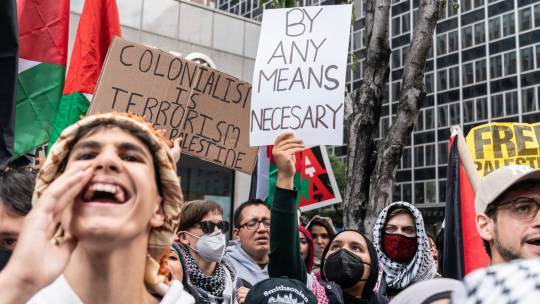
[ Image. Pro-Palestinian supporters march after a rally in New York City, October 9, 2023. Photo by Lev Radin, Shutterstock. ]
Direct evidence of the link between the oppressor/victim mindset and antisemitism was published last week in a poll from Harvard’s Center for American Political Studies and the Harris Poll. The survey was fielded on December 13-14.9 The survey asks about Americans’ beliefs not just about Israel but about Jews in America and on campus as well. I’ll summarize a few of the items, which you can check out in the report, and I'll expand on three in particular, which document the wide reach of the oppressor/victim mindset and its role in causing young people to embrace antisemitism.10
The Harvard-Harris survey found that Americans side strongly with Israel against Hamas in the current conflict––except for Gen Z (here operationalized as the 18-24-year-old age bracket)11, which is evenly divided between support for Israel and Hamas. (See p. 47 of the report.)
I should note that some have rightly criticized the Harvard-Harris poll on methodological grounds, especially for forcing respondents into binary choices, rather than offering a “don’t know” or “undecided” option. When such options are offered many people choose them, sometimes more than half, so the numbers you’ll see below probably overstate the prevalence of antisemitism, in absolute terms. Zach Rausch and I have been collecting all the recent surveys we can find on attitudes toward the Gaza conflict in this Google doc. Many other surveys have confirmed that there is substantially more support for Hamas among Gen Z than among older generations, although some studies find that Gen Z still tilts slightly toward Israel. It is the pattern of responses across questions and generations that I am drawing on, rather than the absolute numbers.
The survey found that Gen Z is not much different than older generations in agreeing that 1. Antisemitism is prevalent on campus (p. 50), 2. Jewish students are facing harassment on campus (p. 50), 3. Calls for “the genocide of Jews” are hate speech (p. 51), and 4. Calls for “the genocide of Jews” are harassment (p. 52).
Yet, despite agreeing with other generations that antisemitism is prevalent on campus, that Jews are being harassed on campus, and that calls for genocide are both hate speech and harassment, Gen Z is evenly divided as to whether campus protesters have a right to call for genocide against Jews. You can see the exact question below the table in Figure 2. As you can see below, all older generations favor disciplinary action as the proper response to students who publicly call for the mass killing of Jews. Only Gen Z does not.

[ Figure 2. “If a student calls for the genocide of Jews should that student be told that they are free to call for genocide or should such students face actions for violating university rules?” Harvard-Harris Poll, December 2023, screenshot from p. 51, with additional annotations by Haidt. ]
Why is Gen Z so tolerant of hate speech and verbal harassment of Jews, when it shows the lowest tolerance for such speech against other groups? The next three items show that the oppressor/victim mindset and common enemy identity politics are at work, but only for Gen Z. One item asked “Do you think that identity politics based on race has come to dominate at our elite universities, or do they operate primarily on the basis of merit and accomplishments without regard to race?” (p. 55). All generations agree that identity politics based on race is now dominant, but Gen Z, which has the most experience with current campus culture, agrees more strongly (69%, tied with those over 65).
The big difference between generations is that only Gen Z endorses this kind of identity politics. One survey item asks: “There is an ideology that white people are oppressors and nonwhite people and people of certain groups have been oppressed and as a result should be favored today at universities and for employment. Do you support or oppose this ideology?” [p. 56]

[ Figure 3. “There is an ideology that white people are oppressors and nonwhite people and people of certain groups have been oppressed and as a result should be favored today at universities and for employment. Do you support or oppose this ideology?” Harvard-Harris Poll, December 2023. ]
Gen Z, and only Gen Z, agrees with the “ideology that white people are oppressors.” The direct line linking this explicit form of common enemy identity politics to antisemitism is found in the responses to the next item: “Do you think that Jews as a class are oppressors and should be treated as oppressors or is that a false ideology?”

[ Figure 4. “Do you think that Jews as a class are oppressors and should be treated as oppressors or is that a false ideology?” Harvard-Harris Poll, December 2023. ]
Gen Z, and only Gen Z, agrees. As I said earlier, the absolute numbers would be lower if a neutral or “don’t know” option were presented, so I do not believe that two out of every three Americans in that age range truly believes that Jews are oppressors. But even if half of the respondents chose a third option, the balance of those who believe it to those who reject it would still tilt toward “oppressors,” and more strongly than for any older generation.
In other words: While all generations agree that race-based identity politics now dominates on campus, only Gen Z leans toward (rather than away from ) endorsing such politics, applying it to Jews, and agreeing that we should treat Jews as oppressors—that is, treat them badly and not protect them from hate and harassment because they deserve what’s coming to them.
I should offer a few clarifications.
First, it is understandable that there is an age gradient, with older generations strongly pro-Israel and younger generations becoming increasingly supportive of the Palestinian cause. Older generations were raised by parents who remembered the Holocaust and understood the context within which the state of Israel was created. Older generations remember the frequent attacks on a vulnerable Israel in its early years. Younger generations, in contrast, have only known a strong Israel that occupied Palestinian territory (at least in the West Bank). There are two sides on this issue. I’m on one side, but I understand that there are good reasons for taking the other side. Opposing Israel or hating the Israeli government is not automatically anti-semitism. What concerns me is that anti-Israel sentiment seems to be increasingly closely linked to hatred of Jews and physical attacks on Jews and Jewish sites. Such attacks may seem morally justified, even virtuous, to those who believe that Jews are “oppressors.”
Second, the Israeli military response has not been “surgical”; its bombing campaign has killed thousands of Palestinians who are not members of Hamas. Young people, most of whom are on TikTok, are probably more exposed than older people to videos of horrific suffering among Gazans. So again, I don’t criticize anyone for protesting Israel or the war, and I hope that universities respect pro-Palestinian students’ First Amendment rights to speak and protest. But the displays of support for Hamas began even before Israel had responded, and part of what was so shocking in the first week after the October 7 attack was the relatively muted and delayed expressions of concern by university leaders and campus organizations. Whatever has caused today’s campus antisemitism, it was already baked in before Israel’s military response began.
Third, I cannot say how much of today’s antisemitism comes from college classrooms (and K-12 classrooms as well), and how much is driven by social media, particularly TikTok. The rapid transition to the “phone-based childhood” that happened around 2012 is a crucial part of the story, which Greg and I discussed in The Coddling. As I have argued elsewhere, social media has introduced dangerous new dynamics into society, including explosive virality and the fragmentation of shared understandings (i.e., the collapse of the Tower of Babel). But given that today’s campus antisemitism is so closely linked with the oppressor/victim mindset, and given that Greg and I (and many others) have been warning about the dangers of teaching this mindset since before TikTok was created, I am confident that American higher education bears a substantial portion of the blame.
I do not believe that those three presidents, testifying before Congress, were antisemitic in their hearts. But in their heartless and gutless responses to a question about when it violates their campus’s rules for students to call for genocide against Jews, all three presidents validated the now-prevalent campus antisemitism. All three presidents essentially said: Jews don’t count, it’s OK to call for their deaths, as long as it does not “turn into action.”
According to those who embrace common enemy identity politics and its oppressor/victim mindset, all members of victim groups are justified in “punching up,” pulling oppressors down, vandalizing their buildings and symbols, and perhaps even raping their women and killing their children. At least, that is the implication of tweets from various professors who praised the Hamas attack, saying versions of “this is what decolonization looks like.”
Conclusion
In the tweet I quoted at the top of this essay, David Frum pointed out that elite college campuses have diverged from the rest of the country. Frum urged those of us in the academy to reflect upon why college campuses are so rife with antisemitism, in a country that is, according to public opinion data, very positive toward its Jewish citizens. I have tried to do that in this essay, concluding that it is our own fault for embracing and institutionalizing bad ideas, rather than challenging them. I have shown a direct connection between the oppressor/victim mindset and the willingness of many in the current generation of students to espouse overtly antisemitic beliefs (even if it is not truly a majority of them).
American higher education is now in a code-red situation. It’s not just Jewish donors and alumni who are withdrawing their support. As you saw in Figure 1, a majority of Americans had low confidence in higher ed before October 7. In the wake of the December 5 congressional hearings, it is now surely a supermajority, including perhaps most Democrats as well. Efforts in red-state legislatures to constrain, control, or defund higher ed will now find a great deal more public support than anyone could have imagined before 2015.
If they are to regain public trust, university leaders will need to understand the victim/oppressor mindset and how their own institutions are encouraging it. Then they will need to take bold action and make deep changes. You can’t just plant a new center for the study of antisemitism in soil that is ideal for the growth of antisemitism. You have to change the soil, change the culture and policies of the institution.
Greg and I have an entire chapter (13) on how to do that, how to create “wiser universities” by enshrining free inquiry, changing the standards used to hire faculty and admit students, and then orienting students for productive disagreement. A wiser university would make students less susceptible to the oppressor/victim mindset even if they are exposed to it in a few of their classes. I will offer many more ideas in future posts. For now, I list organizations that specialize in improving the culture of universities, and I list essays that offer what I think are good ideas. I’ll keep the list updated for a while, so if you find good essays, please post links to them in the comments.
I close this essay with the quotation that opens Chapter 3 of The Coddling, from Rabbi Jonathan Sacks, one of the wisest people I’ve ever had the good fortune to meet:
There is the moral dualism that sees good and evil as instincts within us between which we must choose. But there is also what I will call pathological dualism that sees humanity itself as radically... divided into the unimpeachably good and the irredeemably bad. You are either one or the other.
Universities can and must free students from pathological dualism.
#Jonathan Haidt#The Coddling of the American Mind#antisemitism#oppressor vs oppressed#oppressor#oppressed#oppression#pathological dualism#dualism#intersectionality#postcolonial theory#postcolonialism#colonialism#academic fraud#Hamas supporters#terrorism supporters#pro hamas#palestine#israel#pro palestine#free palestine#islamic terrorism#academic corruption#ideological capture#ideological corruption#terrorist scarf#religion is a mental illness
25 notes
·
View notes
Text
American booktokers get on my nerves sometimes... but let's be real this is part of the bigger issue of how irish is treated as discount Elvish by hack fantasy writers
91 notes
·
View notes
Text

13 notes
·
View notes
Text
Some thoughts on colonialism and indigenous people 🤔 would love to hear your thoughts on this cause i feel like i'm going crazy whenever i'm thinking about this
Of course the decolonization didnt leave former colonized countries in a state that's not still permanently influenced by colonialism. No. Colonialism completely changed those countries and cultures and the effects of it are irreparable. However, at least the white colonialist rule ended. (I'm not bringing neocolonialism into that now)
But then, think about indigenous people. Almost all of their land, maybe even their whole continent was stolen and it never came to an end. The white rule just continued. And the injustice continued. They never got their land back and barely anyone is talking about that????? Wtf? Have they even at least received compensation or anything?
#like#first of all: i want hawaiian sovereignty#colonialism#Hawaiian sovereignty#postcolonialism#native rights
30 notes
·
View notes
Text
Edward Said
I always struggle to decide which of Edward Said's works to recommend first, so:
Orientalism
The Question Of Palestine
Culture And Imperialism
See also:
The Politics of Dispossession (PDF unavailable)
Peace And Its Discontents (PDF unavailable)
#his writing on music is also incredibly rich and interesting btw#Edward Said#postcolonial literature#postcolonial theory#postcolonial#postcolonialism#postcolonialist#postcolonial reading#🍉#Palestine#free Palestine#original
161 notes
·
View notes
Text
youtube
chapter by chapter, in-depth yet easy to understand summaries of pedagogy of the oppressed by paulo freire. videos from dr. masood raja, a pakistani-american writer and former associate professor of postcolonial literature and theory.
—
🚨 want more materials like these? this resource was shared through BFP’s discord server! everyday, dozens of links and files are requested and offered by youth around the world! and every sunday, these youth get together for virtual teach-ins. if you’re interested in learning more, join us! link in our bio! 🚨
#pedagogy of the oppressed#paulo freire#resources#dr. masood raja#youtube#educational equity#education#dialogue#postcolonialism#decolonization#Youtube
13 notes
·
View notes
Text
When Russia launched its full-scale invasion of Ukraine in February, discussions emerged about the imperial nature of the war. Scholars who spoke up about it were quickly dismissed in certain Western academic and political circles.
Some, especially the self-professed “anti-imperialists”, claimed Russia was “provoked” and portrayed Ukraine’s resistance as a “Western imperial” plot. Others considered analyses of Russian imperialism as having a pro-war, hawkish agenda or being a reflection of narrow ethno-nationalist sentiments.
But for scholars from the post-Soviet space – from places that have suffered from Russian aggression and imperialism – these reactions were hardly a surprise. They had been ignored and dismissed before.
[...]
Soviet coloniality was dismissed also because knowledge about the Soviet Union in the West was Russocentric. The Soviet Union was often referred to simply as Russia. There was little knowledge about non-Russian people. Non-Russian émigrés who fled to the West and wrote about Soviet coloniality with firsthand experience of Soviet imperialism were dismissed as anti-Soviet conservative ideologues.
Importantly, the Soviet Union also became a space of projections for those who looked for ways to criticise capitalism and Western imperialism. Those who blamed capitalism for oppression believed that eliminating capitalism would end all forms of oppression. For them, the Soviet Union was an internationalist project that brought equality and freedom to formerly subjugated peoples.
Violence against various nations and ethnic groups was either ignored or treated as a necessary evil of the transition to communism.
Western scholarship also overwhelmingly focused on the Soviet metropoles – Moscow and Leningrad. They knew very little, if at all, about the Soviet peripheries, which meant that nobody really understood the uprisings in Central Asia, the Caucasus or the Baltics from the late 1980s onwards or the bloodshed in Tajikistan, Nagorno-Karabakh, Transnistria, Abkhazia, South Ossetia and later Chechnya.
[...]
In Russia itself, the dominant narrative was one of victimhood. Russians learned to see themselves as a special nation that sacrificed its own wellbeing for the sake of non-Russians in the Soviet Union. “Let us stop feeding them” was the slogan Russians used to explain Moscow’s decision to let the colonies go in 1991.
[...]
This is how late Professor Mark von Hagen recalled in 2016 the political atmosphere back then: “Again, George Bush … was defending Gorbachev until the very last possible moment because he and the United States government at that level, with a few dissenting voices, wanted to keep the Soviet Union together because they were so afraid of the kind of crazy, fascist nationalism that they thought the Ukrainians represented.”
[...]
That is why Western academia and political circles had little to say about the genocidal wars Boris Yeltsin and his successor, Vladimir Putin, led in Chechnya. Rather than seeing people claiming sovereignty and nationhood, the West readily bought into their portrayals of Chechens as bandits, nationalists and terrorists. That is why they also failed to see Russian imperial ambitions in Eastern Europe – the 2008 war on Georgia, the annexation of Crimea, etc – as such.
#soviet union#russia#communism#ussr#colonialism#postcolonialism#war#socialism#politics#history#academics
583 notes
·
View notes
Text
Mountain, Stone 🇵🇸🕊️
BY LENA KHALAF TUFFAHA
Do not name your daughters Shaymaa,
courage will march them
into the bullet path of dictators.
Do not name them Sundus,
the garden of paradise calls out to its marigolds,
gathers its green leaves up in its embrace.
Do not name your children Malak or Raneem,
angels want the companionship of others like them,
their silvery wings trailing the filth of jail cells,
the trill of their laughter a call to prayer.
Do not name your sons Hamza.
Do not taunt the torturer’s whip
with promises of steadfastness.
Do not name your sons
Muhammad Ahed Zakaria Ismail,
they will become seashells, disappear in the sand.
Do not name your children. Let them live
nameless, seal their eyelids
and sell their voices to the nightingale.
Do not name your children
and if you must
call them by what withstands
this endless season of decay.
Name them mountains,
call them stone.
14 notes
·
View notes
Text
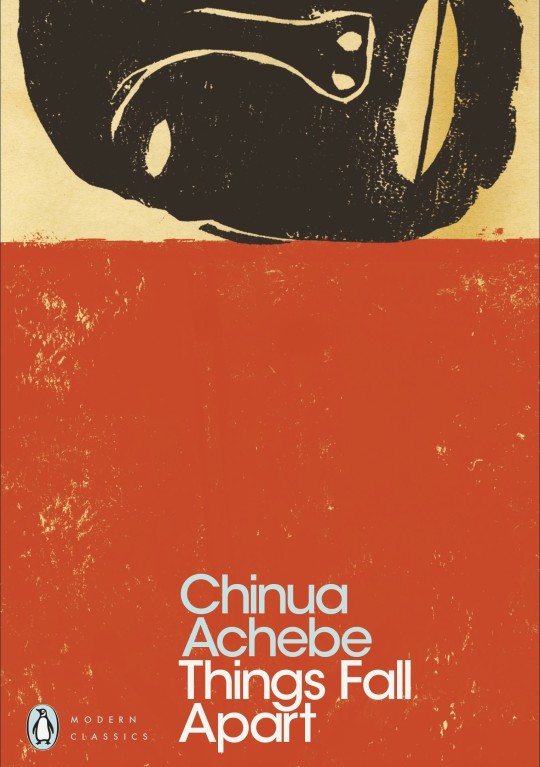

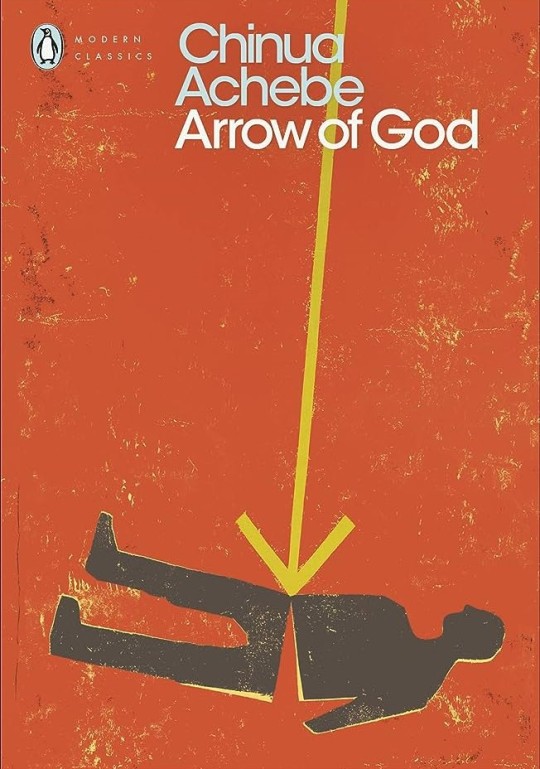
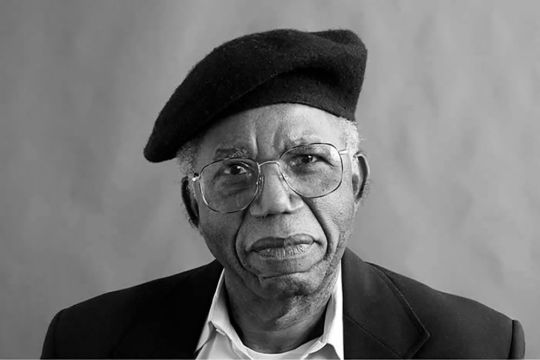
Penguin Books covers of Chinua Achebe novels.
1. Things Fall Apart (1958)
2. No Longer At Ease (1960)
3. Arrow of God (1964)
Chinua Achebe was a Nigerian novelist and critic pivotal in the decolonial literature movement. His novel, widely considered to be his masterpiece, titled Things Fall Apart explores themes such as the paradoxical complexity of masculinity, pride and egoism in culture, and the idea of destiny. His novel essay An Image of Africa (unpictured) responds to Joseph Conrad's classic titled Heart of Darkness refuting Conrad's depiction of African people, culture and continent as grotesque, savage, and a land frozen in primitive brutality. Achebe defended the adoption of the English language in pan-African writing, noting its ability to reach broad audiences.
Achebe worked in politics during the Nigerian Civil War, and lectured in universities in Nigeria and the United States throughout his lifetime and until his retirement.
19 notes
·
View notes
Text
ok i'm so confused on how tumblr works but hello hey if anyone is interested in social reproduction theory, marxist feminism, black feminism, and postcolonial feminism in the vein of lise vogel, tithi bhattacharya, cinzia arruzza, chandra talpade-mohanty, sylvia wynter, himani bannerji, etc. we should talk
71 notes
·
View notes
Text

Our Sister Killjoy; Ama Ata Aidoo
#quotes#extracts#ama ata aidoo#book quotations#postcolonialism#postcolonial literature#postcolonial theory#neocolonialism#literature#oppressor#colonialism
24 notes
·
View notes
Text
March pick: Envisioning African Intersex pt 2
Continuing our trend of alternating between fiction and non-fiction, our pick for March is the second half of Envisioning African Intersex: Challenging Colonial and Racist Legacies in South African Medicine, by Amanda Lock Swarr.

This is an academic text, so we won't be reading the whole thing! The book is split into two parts, one on colonial history and one on resisting colonial intersexism. To make things manageable we will be reading only the second part! There are three substantive chapters and an epilogue:
Chapter 3: Defying Medical Violence and Social Death, Sally Gross and the Inception of South African Intersex Activism
Chapter 4: #HandsOffCaster: Caster Semenya's Refusals and the Decolonization of Gender Testing
Chapter 5: Toward an "African Intersex Reference of Intelligence": Directions in Intersex Organizing
Epilogue: Reframing Visions of South African Intersex
Like most academic books, each chapter is a self-contained unit. You can pick and choose which chapters to read, and read them in whichever order you choose. (Starting with the epilogue is a common tactic!)
To ensure everybody has access to the book, a pdf copy is available through the discord.
Content notice: as you might expect, this book will discuss intersexism, colonialism, and racism.
When we're meeting
We will be meeting to discuss the four chapters on Fri Mar 29, at:
- 12:30-14:00 Pacific (Vancouver, San Francisco, etc)
- 15:30-17:00 Eastern (Toronto, New York, etc)
- 21:30-23:00 Central European (Berlin, Paris, etc)
for more time zones see here
To join the discord: https://discord.gg/U8ZucKwGPK
Also see: our code of conduct
How much of the book do you need to read?
You don’t need to finish all four chapters to participate! You are welcome to skim and/or skip chapters as desired.
Current & future book picks
If this isn’t in the cards for you, we’re reading sci-fi short story collection The Trans Space Octopus Congregation for April!
#intersex book club#book picks#intersex books#intersex studies#queer theory#gender studies#postcolonialism#postcolonial literature#post colonial studies
3 notes
·
View notes